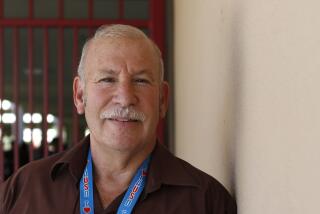ANAHEIM : Executives Fill Shoes of Principals
- Share via
Roze Barrio knew you needed to be smart, organized and enthusiastic to be a school principal, but was surprised when told she would need flats for her one-day stint at Horace Mann Elementary School.
“I’m glad I was told,” Barrio said. “It’s an active role. It’s certainly not passive. You have to be at one place and then it’s on to the next crisis. You never get to sit.”
Barrio, 47, an administrator with Industrial Medical Clinics Inc. in Anaheim, was one of 275 businessmen and women who took part Tuesday in the Orange County Department of Education’s “Principal for a Day” program. The goal is to give executives an inside look at education and the challenges in local schools.
“We need to forge closer links between business and education,” county organizer Lorraine Dageforde said. “Often, business people are critical of the public schools. Rightly so, sometimes. They want to have an educated work force.
“But they need to have an understanding of what the schools face,” Dageforde said. “The multicultural backgrounds of the students, the drug problems and the other factors that keep kids at risk (of dropping out). If they hear from us, they will know what we need.”
Industrial Medical is already sponsoring programs at Horace Mann, but Principal Evelyn Weisman on Tuesday offered Barrio a firsthand look at its operations, its students and the challenges faced by its teachers.
Horace Mann is just north of downtown Anaheim. The school, built for about 700 students, now has 875 with the addition of six portable classrooms. Less than half the students are fluent in English. The average class has 32 students, about five more than most teachers feel should be the classroom limit.
“If she gets one thing out of this, I hope she learns to appreciate teachers,” Weisman said. “They give so much more to their students than teaching.”
Barrio’s day began with a meeting with a parent who said her first-grade son was being picked on by another boy. Weisman and Barrio went and talked to the other boy, patiently listening to his denials, before gently reminding him that he must treat others with respect.
The boy was so “cute,” Barrio said, that she almost believed his denials.
It was not an atypical problem; about an hour of her seven-hour day involved discipline situations. The rest of the time she and Weisman were in classrooms listening, on the playground supervising recess and lunch and, for a few minutes here and there, in the office doing paperwork.
At one point, they were in a fourth-and-fifth-grade classroom, where Frances Falt was teaching her students to speak English by asking them to describe an imaginary day at the beach.
“What a pleasurable class,” Barrio said. Falt’s “approach is very unique. It’s hard to believe that many of these children have only been speaking English for a year.”
Throughout the day, teachers would approach Barrio and Weisman with minor problems, like getting maintenance to reposition a classroom TV so teachers wouldn’t bump their heads on it.
“Being a principal is more like being a general manager than a CEO,” Barrio said, adding that in business a manager must deal with routine crises, while chief executive officers have subordinates to iron out the details. “It’s a challenging role.”
More to Read
Sign up for Essential California
The most important California stories and recommendations in your inbox every morning.
You may occasionally receive promotional content from the Los Angeles Times.













